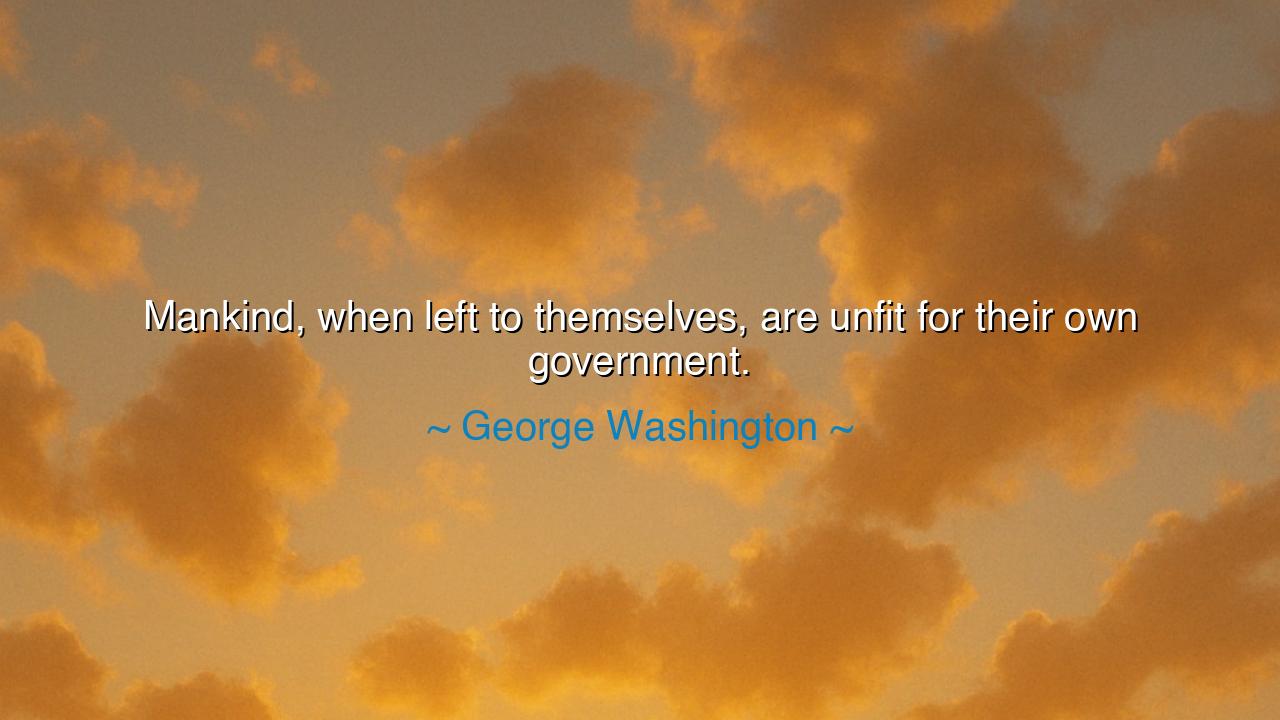
Mankind, when left to themselves, are unfit for their own






In the voice of one who bore the weight of liberty upon his shoulders, George Washington, the father of a nation, once declared: “Mankind, when left to themselves, are unfit for their own government.” These words, uttered by the first President of the United States and commander of its revolution, carry the gravity of experience — the hard-earned wisdom of a man who had seen both the glory and the chaos of freedom. To the careless ear, his statement may sound like doubt in human capacity, but to the discerning heart, it is not despair — it is warning, born of love for country and faith in order. Washington, the soldier turned statesman, understood that liberty without discipline is ruin, and that passion without principle is the seed of tyranny.
The origin of this thought lies in the turmoil that followed victory. After the long war against Britain, America stood free — yet uncertain. The Articles of Confederation, weak and divided, left the young nation floundering in debt, disunity, and unrest. Washington, having led men through battle and witnessed their courage, also saw their flaws — their factions, their selfishness, their hunger for power cloaked as freedom. He watched as the same people who had shed blood for liberty now threatened it through disorder and pride. From this, he learned a truth older than nations: that mankind, though noble in spirit, is fragile in virtue. Left without guidance or law, men do not rise to their best — they descend to their base. Thus, he spoke not against freedom, but for its guardianship — for the necessity of structure, wisdom, and moral restraint in the art of self-government.
Washington’s warning echoes through the corridors of history. In ancient Athens, the birthplace of democracy, the people once wielded freedom as a weapon instead of a gift. They banished philosophers, executed their own heroes, and turned their assemblies into battlegrounds of passion and greed. Without balance or temperance, their democracy collapsed into tyranny. Likewise, the Roman Republic, built on civic virtue and law, crumbled when ambition and division tore it apart. In both cases, the same truth emerged — mankind, when left entirely to their impulses, can destroy what they most cherish. Washington, a student of these histories, knew that liberty could perish not from foreign kings, but from the undisciplined heart of man himself.
Yet Washington was no cynic. He did not scorn the people; he believed in them deeply. But he understood that human beings are creatures of both reason and passion — and therefore need government not as a prison, but as a guide. To govern oneself, he taught, requires the same strength as commanding an army. It is the labor of virtue, the discipline of justice, and the humility to submit to law. True self-government is not the absence of rule, but the mastery of it — not chaos disguised as freedom, but order born of conscience. When he said that mankind is unfit for self-rule when left alone, he meant that freedom must always be bound to wisdom, lest liberty devour itself in the flames of desire.
Consider the dark lesson of the French Revolution, which unfolded soon after Washington’s time. The people of France, weary of monarchy, rose in the name of liberty — but without moral restraint, their uprising turned to blood. The cry for freedom became the shriek of the guillotine; the revolution that promised equality delivered terror. Where there was no guiding hand, the mob became its own tyrant. Washington foresaw such a fate and urged his people to build a government that would balance passion with principle — a republic ruled not by impulse, but by law; not by kings, but by character.
In this, Washington speaks also to the soul of every person. For each of us carries within our breast a small republic — a nation of thoughts and desires that must be governed. Left unchecked, anger becomes despotism, and greed becomes corruption. Only when the heart learns discipline, when reason reigns over impulse, can one truly be called free. Thus, the lesson of Washington is not merely political — it is moral. Before a nation can govern itself, its people must first govern their own hearts. Government, he reminds us, is but a reflection of the governed; if men cannot rule themselves, no constitution can save them.
The lesson, therefore, is eternal: freedom demands virtue. It cannot survive in the hands of those who confuse liberty with license or independence with indulgence. To preserve a nation, or even a soul, one must be both free and wise — strong in courage, yet humble before the law. Washington calls us, even now, to live as guardians of our own self-control, to uphold order not by force, but by character.
So, my child of liberty, remember his words as both a warning and a blessing. The world is full of those who cry for freedom yet flee from discipline. Be not among them. Build within yourself the same structure that Washington built for his nation — a spirit governed by honor, guided by reason, and bound by justice. For when mankind learns to govern the self, the need for tyranny vanishes, and freedom — true, enduring freedom — shall reign not by force of law, but by the strength of virtue.






AAdministratorAdministrator
Welcome, honored guests. Please leave a comment, we will respond soon